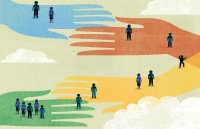Dispelling Myths Around Learning Disabilities
Many students struggle with learning or attention issues like autism, dyscalculia, or ADHD, yet only 17 percent of teachers feel prepared to support them, a new report finds.
Your content has been saved!
Go to My Saved Content.When Temple Grandin—a pioneer in the field of animal behavior who also has autism—worked on a farm milking cows, she had difficulty remembering each step in the process. No matter how many times she was shown how to do it, the information wouldn’t stay straight in her head. “I absolutely cannot remember a sequence of instructions,” she explains.
Despite being a brilliant engineer with incredible spatial intelligence—she could mentally picture a complex device, see each individual part in action, and disassemble it in her head—she almost lost her job because she failed at far simpler duties. Eventually, she taped a checklist to the wall that outlined each step in the process, saving herself from getting fired.
A new report from the National Center for Learning Disabilities and Understood—two national leaders in supporting children with learning disabilities—attempts to dispel many of the misconceptions that teachers have about learning disabilities, including autism, dyslexia, dysgraphia, dyscalculia, ADD/ADHD, and other processing disorders. Like Grandin, millions of children—as many as one in five, according to the report—struggle with ordinary, everyday tasks. These students have the potential to succeed, even spectacularly so, yet are persistently at higher risk of underperforming academically or dropping out of school.
“Contrary to popular myths, learning and attention issues are not the result of low intelligence, poor vision or hearing, or a lack of motivation,” the report states. “We know that students with learning disabilities and ADHD have brain-based difficulties in specific areas: reading, writing, math, organization, attention, listening comprehension, social skills, motor skills or, often, a combination unique to the person.”
Yet many teachers don’t realize that students with learning disabilities are often fully capable of understanding a lesson. In a survey of 1,350 teachers, a majority were “highly interested in learning how to reach struggling learners,” but only half believed that these students could perform at grade level. More troubling, one in four believed that ADD/ADHD was the result of bad parenting, for example, and one third viewed a student’s learning disability as a lack of motivation—not as a difference in brain development.
In analyzing teacher training programs across the U.S., the report found that “virtually all states set a low bar for preparing general educators to teach students with disabilities.” While the Individual With Disabilities Act (IDEA) mandates that students with disabilities be in the “least restrictive environment”—more than 70 percent of students with learning disabilities now spend most of their time in general education classrooms—only 17 percent of teachers reported feeling well-trained in their certification programs. Instead, they cited “on the-job training and trial-and-error learning” as their primary source of useful information.
So what should teachers do? While it’s certainly important to provide structural support—in the form of professional development, funding, and support staff at the school—the report cites research to bolster its claim that individual teachers should also focus on developing:
- A strong sense of self-efficacy, or the belief that they are capable of improving learning outcomes for their students. These teachers design high-quality, engaging lessons, spend more time with struggling students, and are able to give supportive—not critical—feedback.
- A positive orientation toward inclusion and personal responsibility for all students. These teachers believe that all students can succeed. They create a warm classroom environment where students feel welcome.
- A growth mindset. Students should be given the tools to be able to solve problems independently. They should also be encouraged to see the value of persistence, self-regulation, and effort in driving success.
It’s not enough to just have the right mindset, however. The report also identifies eight evidence-based practices, from flexible grouping to culturally responsive pedagogy and explicit, targeted instruction, to be critical in helping these students succeed—not just for students with learning disabilities, but all students. For example, multisensory approaches give students more ways to connect with what they’re learning, boosting engagement across a wide range of student abilities while making lessons more memorable for everyone. And when students have difficulty with executive function skills, like staying organized or regulating their own emotions, it’s important to explicitly practice those skills.
One final takeaway from the report: A common mistake is to define students by their learning disabilities, but this can obscure the “incredible strengths” that they may possess. Research shows that people with dyslexia often have stronger visual-spatial problem-solving skills than people without dyslexia, for example. Teachers should make every effort to recognize and nurture the strengths that these students possess. Many of these students will make impactful contributions to society—perhaps following in the footsteps of Steven Spielberg, Anderson Cooper, or Cher, among others—but need the support, encouragement and patience from teachers to help them reach their full potential.
